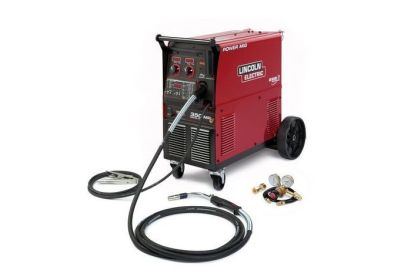Walk into any fab shop or job site, and you’ll hear it—that sharp, steady crackle of MIG welding. It’s fast, efficient, and trusted by pros across just about every trade. If you’re running a small crew or scaling up your shop, it’s likely part of how you get things done. And every minute spent tweaking settings or fixing arc issues? That’s time you’re not spending on real work—or making money.
You want smooth starts, a stable arc, and quick adjustments when switching from light sheet metal to heavier steel. Whether you’re stacking bead after bead or jumping between repair jobs and custom builds, your gear needs to move at your pace. A Lincoln Electric welding machine gives you that consistency. And if you’ve ever wondered, are Lincoln Electric welders good enough for serious work? The answer, as many pros will tell you, is yes. Lincoln Power MIG welders are the go-to for builders, fabricators, and anyone who needs to join metal fast and clean. But picking the right setup? That’s not always so simple. Here’s what to keep in mind.
How MIG Welding Works
MIG stands for Metal Inert Gas welding. It’s a semi-automatic process that uses a continuous wire feed as both the electrode and filler metal. As the wire melts, it fuses the base materials together, while a shielding gas protects the weld from contaminants in the air. You control the arc through a trigger on a handheld torch, and the welding machine handles the wire speed and voltage based on your settings. It’s this ease of control that makes a Lincoln MIG welder a favourite among newer welders and seasoned pros alike.
The setup typically includes:
- A Lincoln Electric MIG welder (power source)
- A wire feeder (often built-in)
- A spool of wire (solid or flux-cored)
- A shielding gas tank (unless you’re running flux-core)
- A ground clamp and torch
That’s your Lincoln welders’ basic kit, and depending on the type of welding you do, every part of it can be customized.
What Should You Consider When Choosing a MIG Welder?
What Materials Are You Welding?
Mild steel, stainless steel, aluminum—MIG can handle them all, but you’ll need the right setup for each.
Mild steel is the most forgiving and commonly welded with MIG. It pairs well with both solid wire and flux-core. Most Lincoln welders in your lineup can handle this material, so if that’s your main focus, you’ve got plenty of flexibility.
Stainless steel requires a different shielding gas blend (usually tri-mix: Argon + CO₂ + Helium) and solid stainless wire. If this is something you’re doing often—like food-grade fabrication or railings—it’s worth investing in a Lincoln Power MIG system with precise voltage control and clean arc starts to avoid discolouration and warping.
Aluminum is more demanding. You’ll need a Lincoln Electric model that’s spool gun ready or equipped for push-pull feeding, as aluminum wire is soft and prone to bird nesting. It also benefits from pulse or pulsed-spray transfer modes, which reduce spatter and distortion. If aluminum is part of your work, make sure your Lincoln MIG welder supports it before you buy.
Pro tip: If you switch between materials, a multi-process welding machine or one with multiple program memory settings can make transitions faster and more consistent.
How Thick is the Metal?
Metal thickness directly affects the amount of power and duty cycle you’ll need from your welding machine. Choosing the right Lincoln Electric welder allows you to get clean, consistent welds without overworking your equipment.
- Thin material (under 1/8”) is ideal for a 115V Lincoln Electric MIG welder. Compact machines are perfect for light-duty jobs such as auto body repair, shelving, thin brackets, and other sheet metal work. With flux-core capabilities and up to 120 amps of output, it’s a practical solution for home workshops, hobbyists, and mobile welders handling smaller tasks.
- Mid-range thickness (1/8” to 3/8”) typically calls for a 230V Lincoln welder or a dual-voltage unit that can offer the added power and arc stability required for more demanding applications. These strike a balance between performance and versatility, making them a solid fit for general fabrication, fencing, small-scale structural work, and everyday shop use.
- Thick steel (over 3/8”) or projects requiring multi-pass structural welds demand a higher-output welder with a longer duty cycle and enhanced arc features. These industrial-grade Lincoln welders are designed for all-day use in fabrication shops, on job sites, or in production environments where consistency, penetration, and power are critical.
Rule of thumb: The thicker the material, the more heat and weld time you’ll need. Choose a machine that can keep up with the work you do. Buy once, not twice.
Where Are You Welding?
Indoor or outdoor? In a shop or out in the field? Your environment can influence the best choice.
- Indoor/shop welding is perfect for traditional MIG setups using shielding gas. It produces a clean weld with minimal spatter and less cleanup. That’s where a solid Lincoln Electric welding machine earns its keep, especially for table work, metal fab, or light production.
- Outdoor or field welding is a different game. Shielding gas can be unreliable in wind or on uneven ground. In these cases, a flux-core capable Lincoln MIG welder lets you ditch the gas bottle and weld wherever the job takes you.
- If you’re working in tight spots or mobile setups, a compact inverter-style Lincoln Electric machine that runs on 120V or a generator gives you the flexibility to get in and out without dragging around half a shop.
Do You Want Simplicity or Precision Control?
If you’re newer to welding or running a mixed-skill crew, simplicity is key. A Lincoln Power MIG welder with intuitive controls and digital presets lets you get to work fast—no trial and error required. Just plug it in, pick your settings, and go.
But if you like to fine-tune every pass or if you’re working with tougher materials like stainless or aluminum, you’ll want full manual control. That’s where higher-end Lincoln Power MIG welders stand out, offering advanced arc control and precision settings that experienced welders depend on.
So, are Lincoln Electric welders good for professionals and weekend welders alike? Without a doubt. For home projects, the 140 MP® and Handy MIG® are easy to run and reliable. In shops, the 180C, 215 MPi™, and SP-180T offer solid performance. The Lincoln Power MIG 210 has been discontinued and replaced by the 215 MPi, though limited stock of the Lincoln Power MIG 210 may still be found. For heavy-duty work, the CV305, CV400, and 256 One-Pak get it done.
Since 1988, Jean-Claude Cayer has been helping Eastern Ontario’s contractors get the job done right with quality tools, expert advice, and a commitment to service. We offer a Lincoln Electric lineup built for every level, from weekend fixes to full-scale fabrication. Alongside our welding machines, we also supply a wide range of power tools, grinders, drills, and saws to support every part of your project. With the right equipment, you’ll work faster, cleaner, and with fewer headaches. And if you’re not sure what fits best, just ask. We’re here to help. Contact us today.











